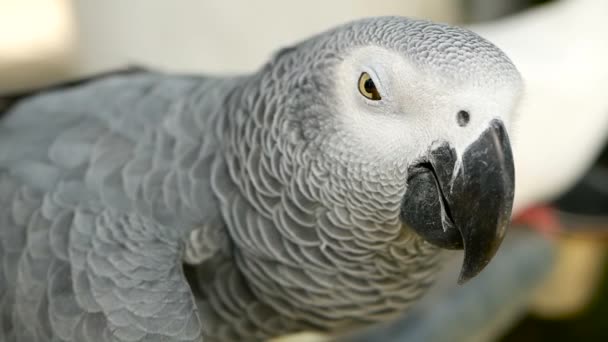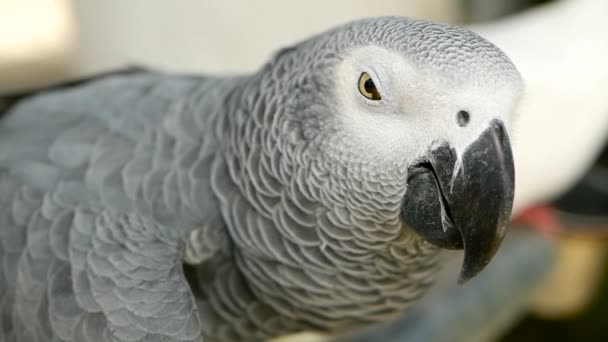ANIMAL: Congo African Grey Parrot Psittacus erithacus Type of Animal: Parrot Habitat: Forests (usually lowland but can be found as high as 7,217.85 ft), forest edges/clearings, mangroves, wooded savanna, cultivated areas, gardens, savanna, woodland, savanna forest, open land adjacent to woodlands, islands in rivers, scrub forest Location(s): SE Ivory Coast, S Ghana, S Togo, S Benin, S Nigeria, S Cameroon, Equatorial Guinea, Gabon, Congo region, Uganda, part of W Kenya, W Rwanda, W Burundi, small of W Tanzania, extreme NW Angola Appearance: Light-grey coloration, all black beak, grey body, slight white edges on head/body feathers, red tail feathers Food/Diet: Seeds, nuts, fruits, berries, vegetation, greens, vegetables, legumes, leaves, insects, grains Status in Wild: Threatened Conservation: Breeding in zoos & aviculture Lifestyle: Can be found in flocks ranging from 2-300 birds. Breeding pairs monogamous, either nesting alone or in loose colonies of up to 100 monogamous pairs. Additional Info: Called: Male: Cock Female: Hen Young: Chick Group: Flock Weight: Male: 21 oz Female: 14 oz Young: 7 oz Gestation: 1 month Life Span: 25 years in wild, 40-70 years in captivity Height: Male: 1.16 ft Female: 1 ft Body Length: Male: 1.16 ft Female: 1 ft Tail Length: 0.5 ft, same for both sexes Main predators of adults are raptors, snakes, crocodiles, chimps, bonobos, felids, wild/domestic pigs, & canids. Monkeys prey on young. Due to eating habits, play important role in seed dispersal helping propagate forest. Have 1.5-1.6 ft wingspan. Sexually mature at 3 years old. Threatened due to pet trade, habitat loss, logging, mining, & persecution as crop pests. Pairs lay 1-5 eggs per clutch, usually in tree cavities. Chicks stay w/ parents for 4-6 months. Breeds once or twice a year. Often when foraging, some flock members stay on ground while others stay higher up as way to keep eye out for predators. Fun Fact(s): While threatened in wild, they’re popular pets & can outlive owners. Known to be very smart having cognitive abilities of 3-6 year old child. These parrots can mimic human speech, identify shapes/colors, learn number sequences, ask unprompted questions, & hold entire conversations. Even capable of deductive logic & probabilistic reasoning. Probably smartest parrots if not smartest birds on the planet. 1 famous parrot named Alex subject of 30 year experiment by animal psychologist Irene Pepperberg, 1st at University of Arizona, then at Harvard, & then at Brandeis where he died at 31 in September 2007. Had vocab of over 100 words, recognized up to 50 different objects, recognized quantities up to 6, distinguished 7 colors & 5 shapes, & understood concepts of opposites. Irene Pepperberg wrote Alex & Me in September 2009, which became New York Times bestseller.

